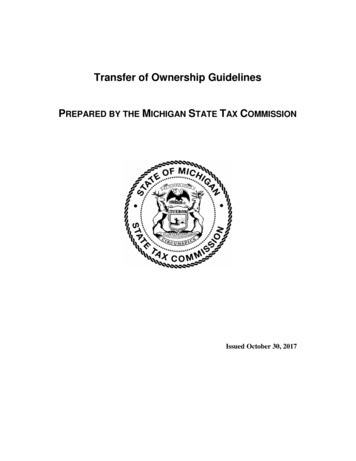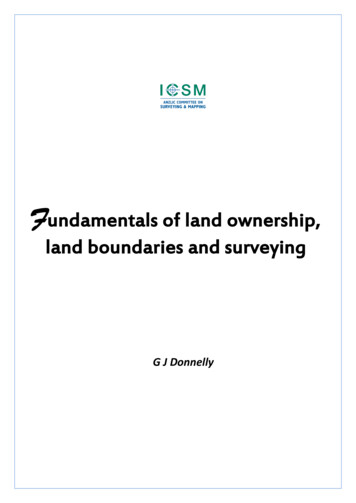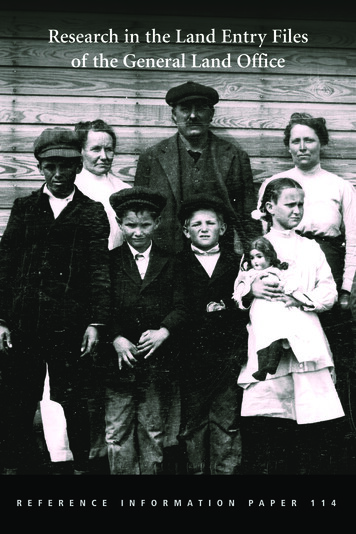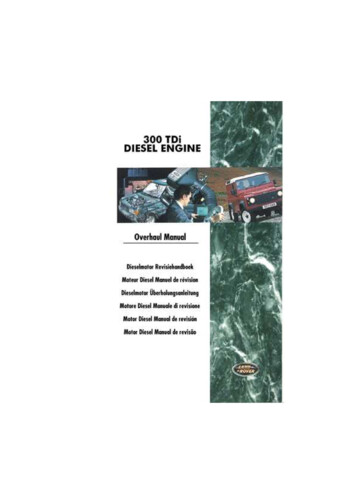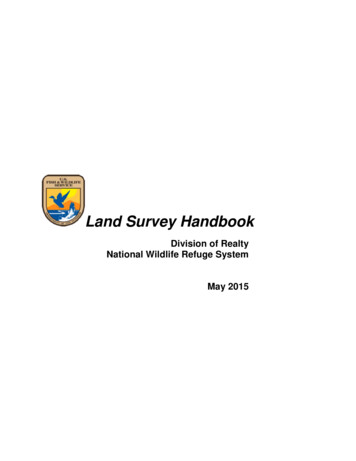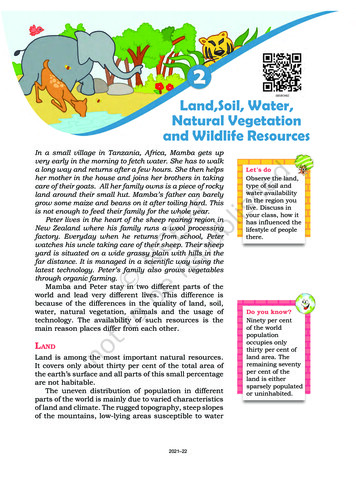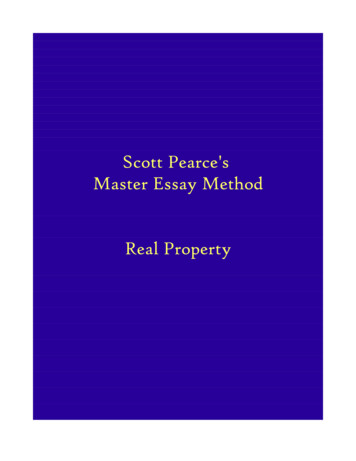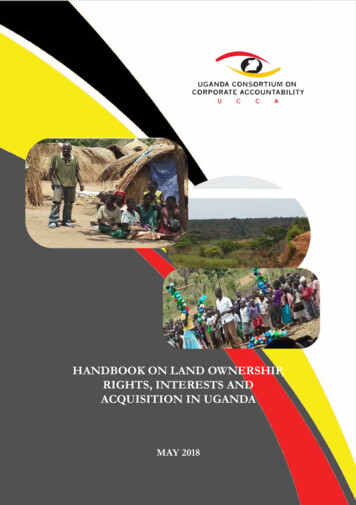
Transcription
HANDBOOK ON LAND OWNERSHIP,RIGHTS, INTERESTS ANDACQUISITION IN UGANDAMAY 2018
COVER PIC: Pictures taken in Rwamutonga in 2016. A community of over 250 familiesliving in a camp after being violently evicted to make way for the construction of an Oil WasteTreatment Plant.
Handbook on Land Ownership, Rights, Interestsand Acquisition in UgandaMAY 2018
Handbook On Land Ownership, Rights, Interests And Acquisition In UgandaTABLE OF CONTENTS1.THE POLICY AND LEGAL FRAMEWORK RELATING TO LANDOWNERSHIP, RIGHTS, INTERESTS AND ACQUISITION INUGANDA.22.KEY TERMS DEFINED.53.LAND OWNERSHIP.154.KEY CONSIDERATIONS FOR LAND TRANSACTIONS .21a.Rights and Duties of Tenants by Occupancy and KibanjaHolders.22b.Right of Spouses to give Consent for Transactions on FamilyLand.23c.Rights of Beneficiaries to Estates of Persons who die without aWill.24d.Customary Land.255.SURFACE RIGHTS ON LAND WITH NATURAL RESOURCES.29A Table Matrix below Showing Various Statutes with Provisions thatdeal with Access to Land with Mineral Deposits and Other NaturalResources and Compensation for Surface Rights.316.LAND ACQUISITION.39a.Public Interest Defined.40b.Compensation.447.LINKAGES BETWEEN LAND AS A PROPERTY RIGHT ANDOTHER HUMAN RIGHTS.43A Table Matrix below Showing Various Statutes with Provisionsaround Compensation for Land Rights.438.SELECTED CASES & COURT DECISIONS ON COMPENSATIONFOR LAND ACQUISITION.639.MECHANISMS TO REPORT VIOLATIONS OF LAND RIGHTS.6910.FORCED EVICTIONS.754
Handbook On Land Ownership, Rights, Interests And Acquisition In UgandaIntroductionIn 2016, the Uganda Consortium on Corporate Accountability (UCCA) launched“The State of Corporate Accountability in Uganda Report.” The report was an outcomeof the 2016 baseline study on the effects and impact of corporate activities onhuman rights in Uganda. The baseline was conducted in the areas of Karamojawithin its mining sector, Mukono focusing on Stone quarrying and Hoima and Buliisalooking at the various activities within the oil and gas exploration. One of the majorissues found across all regions visited, concerned increase in land speculators in lightof natural resource and infrastructural developments, land grabbing and forceful andillegal evictions. The UCCA team spent considerable time with affected communitiesand also conducted follow up meetings and situation analysis in Tororo around theUsukuru phosphate mining project. Issues of land ownership, interests and acquisitionwere recurring from the affected communities in all visited areas. It was noted thatmany vulnerable communities living in resource rich areas, and some of theCommunity Based Organisations (CBOs) operating there did not fully comprehendthe Uganda land tenure system and legal and policy framework therein. It was notedthat issues of land rights, interests and compulsory acquisition of land remainedillusory within affected communities and various stakeholders working in the regions.There have been follow up engagements with communities and various stakeholdersaround mainstreaming corporate accountability in Uganda. These continuousengagements entail a critical discussion around land rights and acquisition processes inUganda. The UCCA and its partners continue to raise awareness and conduct trainingswith CSOs and CBOs around business and human rights. These engagements alsoextend to government standard setting and regulatory agencies around enhancingcorporate accountability in Uganda.This Handbook is a key resource highlighting Uganda’s land tenure system and thevarious policies and legal framework concerning modes of acquiring rights and interestin land and the requirements that have to be fulfilled for compulsory acquisition ofland by the government. The handbook also briefly reflects on the linkages betweenproperty rights and other human rights and the international guidelines around forcedevictions. Largely, the handbook focuses on the domestic policy and legal framework.We hope that this handbook will be a useful guide for the various stakeholders toprovide basic guidance on key aspects related to land in a simplified manner. Thatultimately cases of land grabbing arising out of ignorance of these basic concepts willgreatly reduce and to empower communities and different holders of interests in landto have Free Prior and Informed Consent in all land related transactions.1
Handbook On Land Ownership, Rights, Interests And Acquisition In Uganda1THE POLICY AND LEGALFRAMEWORK RELATINGTO LAND OWNERSHIP, RIGHTS,INTERESTS AND ACQUISITION INUGANDA2
Handbook On Land Ownership, Rights, Interests And Acquisition In UgandaThe Policy and Legal Framework Relating to LandOwnership, Rights, Interests and Acquisition in Ugandaa.b.c.d.e.f.g.h.i.j.k.l.m.n.o.p.q.r.s.t.The Constitution of Uganda, 1995The Land Act, Cap 227 as amendedThe Land Acquisition Act, Cap 226The Land Policy, 2013The Registration of Titles Act, Cap 230The National Environment Act, Cap 153The Environmental Impact Assessment Regulation, S.I.No. 13/1998.The Water Act, Cap 152The Mining Act, 2003The Petroleum (Exploration, Development and Production)Act, 2013The Electricity Act, 1999The Investment Code Act, Cap 92The Road Act, 1964The Access to Roads Act, Cap 350The Traditional Rulers (Restitution of Assets andProperties) Act, Cap 247The Succession Act, Cap 162The Illiterates Protection Act, Cap 78The Survey Act, Cap 232The National Forestry and Tree Planting Act, No. 8 of 2003The Physical Planning Act, No. 8 of 20103
Handbook On Land Ownership, Rights, Interests And Acquisition In Uganda“Land is not a mere commodity, but an essential element forthe realization of many human rights. For many people, landis a source of livelihood, and is central to economic rights.Land is also often linked to peoples’ identities, and so is tiedto social and cultural rights.” UN OHCHR4
Handbook On Land Ownership, Rights, Interests And Acquisition In Uganda2KEY TERMSDEFINED5
Handbook On Land Ownership, Rights, Interests And Acquisition In Uganda2.1Land Owner2.4Lawful OccupantAny Ugandan Citizen who owns orholds land under any of the four (4)recognized systems of land holding.(Section 2 of the Land Act)Includes persons occupying land byvirtue of the repealed2.2Tenants by OccupancyThese include bona fide and lawfultenants. They are consideredtenants of the registered owner of theland which they occupy and arerequired to pay annual ground rent.(Sections 1 and 31 of the Land Act)2.3Bonafide OccupantAny person who before the cominginto force of the 1995 Constitutionof Uganda, had either occupied andutilized or developed any landunchallenged by the registeredowner or agent of the registeredowner for twelve years or more; orhad been settled on land by theGovernment or an agent of theGovernment, which may include alocal authority for instance localcouncil chairpersons. (Section 29 (2) ofthe Land Act)1i)ii)iii)Busuulu and Envujjo Lawof 1928;Toro Landlord andTenant Law of 1937; andAnkole Landlord andTenant Law of 19371Other lawful occupants include:persons who entered the land withthe consent of the registered ownerincluding a purchaser; and personswho had occupied land as acustomary tenant/Kibanja holder butwhose tenancy was not disclosed orcompensated for by the registeredowner at the time of acquiring theleasehold certificate of title. (Section29 of the Land Act)These laws were repealed by the Land Reform Decree, 19756
Handbook On Land Ownership, Rights, Interests And Acquisition In Uganda2.5Kibanja Holder/Customary tenantPersons who had settled on the landin Buganda as customary tenants withthe consent of the mailo land owner under the Busuulu and Envujjo Law,1928. A Kibanja holder holds anequitable interest in mailo land whichcan be transferred with consent of aregistered owner. It is worth notingthat Kibanja is peculiar to mailo landfound mostly in Buganda.2 Thefollowing are also recognized asKibanja holders before the law;a.A person who had occupiedland as a customary tenant/ Kibanjaholder but whose tenancy was notdisclosed or compensated for by theregistered owner at the time ofacquiring the leasehold certificate oftitle under the 1975 Law ReformDecree.b.A successor in title of allpersons listed above. (Section 29 (1) ofthe Land Act)22.6LeasePermission to use some one’s landwith exclusive rights for a period ofthree (3) years and above for aspecific purpose with agreed termsbetween the lessor and the Lessee.(Section 101 of the RTA)2.7LessorA landowner who creates a lease andallows another person (lessee) to usethe land for a specific purpose for adefined period with exclusivepossession.2.8LesseeA person who is given a lease by alessor and is allowed to use the landfor a specific purpose during a definedperiod of time, on specific terms withexclusive possession.Mugambwa, John T., ‘Principles of Land Law in Uganda’, Fountain Publishers, 2006, Reprint, p.2.7
Handbook On Land Ownership, Rights, Interests And Acquisition In Uganda2.9Exclusive Possession2.11TenancyPossession or utilization of landwithout interference from the landowner for a given period.An agreement where a land ownergrants another person permission tooccupy land and enjoy exclusivepossession for a period below three(3) years in exchange for rent.2.10SubleaseA lease granted by a lessee to a thirdparty with consent of the lessor for aperiod of not less than three (3) years.The original lessee becomes thesub- lessor and the sub-lesseebecomes the lessee. (Section 109 of theRTA)Tenants do not acquire an interest inland but simply enjoy rights to use theland for the duration of thetenancy. There are three types oftenants namely: periodic tenancies,tenants at will and tenants atsufferance.8
Handbook On Land Ownership, Rights, Interests And Acquisition In Uganda2.12Periodic Tenant2.13Tenant at WillThis refers to a person who enters anagreement with a land owner tooccupy his or her land or property,enjoy exclusive possession and payrent on a regular periodic basis forinstance weekly, monthly, quarterly,bi-annually or annually.3 A periodictenancy is renewable depending onthe agreement between the parties.A tenant who is in possession of theland with consent or permission ofthe land owner before the tenancycontract is finalized or continues tostay on the land after the tenancy hasexpired prior to its renewal. Thistenant is not entitled to notice toleave the premises but it is prudent togive them reasonable notice. (BweyaSteel Works v. National InsuranceCompany (NIC) (1985) HCB 58)Before a periodic tenancy isterminated by either the landlord ortenant, reasonable notice must begiven depending on the terms of theagreement or the period of thetenancy, if the agreement is silenton the notice period.4 For instance aweekly tenancy requires notice of oneweek, a monthly tenancy requiresnotice of one month5 while aquarterly tenancy requires notice ofthree months6 and so on. The onlyexception to this is an annual tenancywhich requires notice of six months.34562.14Tenant at SufferanceA tenant who remains in possessionof the land after the expiry of thetenancy without the consent orobjection of the land owner. Thistenant is not entitled to notice to leavethe premises but it is prudent to givethem reasonable notice. (ChristopherSsebuliba v. AG Supreme Court CivilAppeal No. 13 of 1991)Bweya Steel Works Ltd v. NIC 1985 HCB 58.Prudential Assurance Co. v. London Residuary (1992) 3 ALLER 504.Queens Club Gardens Estate Ltd v. Bigwell (1942) 1 KB 117.Musumba v. Haji Kasaka (1971) 1 ULR 222.9
Handbook On Land Ownership, Rights, Interests And Acquisition In Uganda2.15Licence2.17Legal interest in landPermission to enter another person’sland for some specific purpose, whichwithout such authorization wouldamount to trespass. A licence neithergrants the licensee exclusivepossession nor an interest in the land.This refers to an interest held in landby a land owner who has registeredunder the Registration of Titles Actso as to give the world notice ofhis or her ownership8 for instanceowners of land in the mailo, freeholdand leasehold tenures who have beenregistered.2.16Interests and Rightsin landAn interest relates to ownership whichmight be legal (registered owner andhis or her successors) or equitable (forexample tenants in occupancy orunregistered land owners). Interestsare different from rights to land whichrelate to use of the land for a specificpurpose with the consent of the landowner.7782.18Equitable interest in landThis refers to an interest held in landwhich has not been registered forinstance tenants by occupancy,interest of a spouse in family landand a purchaser of land who has notyet been registered as the land owneramong others. All interests whichhave not been registered under theRegistration of Titles Act areequitable interests.Ssesazi Kulabilawo v.Robinah Nalubega Court of Appeal Civil Appeal No. 55 of 2000.Section 54 of the Registration of Titles Act.10
Handbook On Land Ownership, Rights, Interests And Acquisition In Uganda2.19Persons having aninterest in landAll persons who claim an interest inrespect of land which the governmentseeks to acquire under the LandAcquisition Act including personshaving an interest in an easementaffecting the said land.92.20Land TransactionsThese include selling, leasing,mortgaging or pledging, subdividing,creating rights and interests for otherpeople in the land and creating trustsof the land. (Section 3 (2) of the LandAct)2.21Family Land2.22Ordinary ResidenceRefers to the place where a personcontinuously resides and a placewhich such person intends to makehis or her home for an indefiniteperiod. (Section 38A of the Land Act asamended in 2004)2.23Land from which afamily derives sustenanceMeans— (a) land which the familyfarms; or (b) land which the familytreats as the principal place whichprovides the livelihood of thefamily; or (c) land which the familyfreely and voluntarily agrees, shall betreated as the family’s principal placeor source of income for food.(Section 38A of the Land Act as amendedin 2004)Refers to land— (a) where theordinary residence of a family issituated; (b) where the ordinaryresidence of the family is situated andfrom which the family derivessustenance; (c) which is treated asfamily land according to the norms,culture, customs, traditions orreligion of the family. (Section 38A ofthe Land Act as amended in 2004)9Section 1 (f) of the Land Acquisition Act.11
Handbook On Land Ownership, Rights, Interests And Acquisition In Uganda2.24Caveat2.26EvictionsA document which a person whoclaims an interest in registered landregisters at the Registry of Lands inorder to stop any transactions frombeing carried out in respect to theland. A caveat filed by a spouse onfamily land is a spousal caveat while acaveat filed by a beneficiary is abeneficiary’s caveat.This means removal of a tenant byoccupancy or Kibanja holder fromland by a land owner. An eviction isillegal if the lawful or bonafideoccupant or Kibanja holder isremoved with a threat or use ofviolence without a court order.11 Itis also an illegal eviction where theactions of a land owner make itdifficult or unsafe for occupants tostay on the land so they are forced toleave.2.25Land GrabbingThis means the unlawful and illegaltaking away of land belonging to anindividual or a group of people.10 Itcan be on a large scale by wealthyindividuals or public, private andforeign investors and is usuallycharacterized by force and violenceagainst land owners or occupantsregardless of whether it is registeredland or not registered.1011122.27ResettlementThis means movement of individualsor groups of people from onelocation to another and providingthem with land, shelter and otherbasic needs.12 It can be on apermanent or temporary basis.Land and Equity Movement Uganda (LEMU) (2009), “How does Land Grabbing Happen?” August 2009.Ministry of Lands, Housing and Urban Development, (2015), “What the Law says on Evictions.”Ministry of Lands, Housing and Urban Development, (2015), “Role of Chief Government Valuer (CGV) of theRepublic of Uganda.”12
Handbook On Land Ownership, Rights, Interests And Acquisition In Uganda2.28Compensation2.30ValuationThis is money paid to a person withan interest in land to make up for theloss suffered when the governmenttakes their land through compulsoryacquisition. It must be fair andadequate and should be paid in time,before the land is taken. (MOLHUD,“Guidelines for Compesation, Assesmentunder Land Acquisition,” June 2017)This is the process of determiningthe value of land and structures on it.This is a key process duringcompulsory acquisition to determinethe amount of compensation to bepaid to the land owner.2.29Ground RentThis is money paid annually to landowners tenants by occupancy andKibanja holders. The amount paid asground rent paid by tenants byoccupancy and Kibanja holders isnominal and determined by DistrictLand Boards with the approvval ofthe Minister. Failure to pay groundrent is the only ground for evictingtenants by land owners.13
Handbook On Land Ownership, Rights, Interests And Acquisition In Uganda237. Land ownership.(1) Land in Uganda belongs to the citizens of Uganda andshall vest in them in accordance with the land tenure systemsprovided for in this Constitution.(2) Notwithstanding clause (1) of this articlc(a) the Government or a local government may, subject toarticle 26 of this Constitution, acquire land in the publicinterest; and the conditions governing such acquisition shallbe as prescribed by Parliament;(b) the Government or a local government as determinedby Parliament by law shall hold in trust for the people andprotect natural lakes, rivers, wetlands, forest reserves, gamereserves, national parks and any land to be reserved forecological and touristic purposes for the common good ofall citizens;(c) non citizens may acquire leases in land in accordance withthe laws prescribed by Parliament, and the laws so prescribedshall define a non citizen for the purposes of this paragraph.14
Handbook On Land Ownership, Rights, Interests And Acquisition In Uganda3LANDOWNERSHIP15
Handbook On Land Ownership, Rights, Interests And Acquisition In UgandaArticle 237(1) of the Constitutionstates that land belongs to the citizensof Uganda and Article 26(1) protectsthe right to own property eitherindividually or in association withothers for instance groups of peoplewho hold land communally.The citizens of Uganda hold landunder four (4) tenure systems namelyFreehold, Mailo, Leasehold andCustomary. (Article 237 (3) of the 1995Constitution of Uganda and Section 2 ofthe Land Act)a.Freehold Tenure refers toland held/owned by an individualregistered on the certificate of titleas the land owner for life. There areno tenants by occupancy and Kibanjaholders on this land.An owner of freehold has thefollowing rights:i.Using and developing theland;ii.Entering into landtransactions;Freehold land is the most popular formost Ugandans. Leasehold andcustomary land can be converted tofreehold land. (Sections 28 and 29 of theLand Act)b.Mailo Tenure is land held bya land owner which has its roots fromthe 1900 Uganda Agreement and1928 Busullu Envujjo Law. It is mainlyin the Buganda region,currently central Uganda. Both theland owner registered on thecertificate of tittle and tenants byoccupancy and Kibanja holders haveinterests on this land.Mailo land owners have the samerights as freehold land owners, butthey must respect the rights of lawfuland bona fide occupants andKibanja holders to occupy and live onthe land. (Section 3 (4) of the Land Act)In matters of compulsory acquisitionof mailo land, the land owner, tenantsby occupancy and Kibanja holders areentitled to adequate and faircompensation.iii.Taking and usingproduce from the land;andiv.Giving away the land toany person in a will.(Section 3 (2) of the Land Act)16
Handbook On Land Ownership, Rights, Interests And Acquisition In Ugandac.Leasehold Tenure is land which a land owner allows anotherperson to take exclusive possession for a specific period of three years ormore in exchange for rent. A lease may be created either under a contractbetween the parties or by law. The person granted a lease must use the landfor the specific purpose as agreed with the land owner. (Section 3(5) of theLand Act)A lease is created by law where;i)The person granted the leasedies and his or her successor isregistered as the new lessee;ii)A non-citizen person orcompany which acquires land inUganda because non-citizens cannotown mailo, freehold or customaryland;iii)A Ugandan who holds landin freehold and mailo tenure losestheir citizenship, their landautomatically changes to a lease of99 years.13 This is because anon-citizen can only own land inleasehold tenure. (Section 40 of theLand Act)1314During the process of compulsoryacquisition of leasehold land by thegovernment, the law recognizes twointerests over the property inquestion:i)The rights of the persongranted a lease; andii)The interest of the landowner.14Therefore, both these parties areentitled to compensation from thegovernment in the event ofcompulsory acquisition.The Land Act as amended in 2004, Section 40 (6)Id., Section 3(5)(a) - (e).17
Handbook On Land Ownership, Rights, Interests And Acquisition In Ugandad.Customary Tenure is wherethe land is owned based on the normsand traditions of a given society orcommunity. One can even own landindividually under customary tenureas long as it has been handed downfrom generation to generation usingthat society’s customs.15Special protection is accorded to therights of women, children andpersons with a disability to own,occupy or use customary land.(Section 27 of the Land Act)In 2015, the government of Ugandaintroduced Certificates of CustomaryOwnership (CCOs) for owners ofcustomary land. A customary landowner can apply for a CCO as proofof ownership of the land.Any person, family orcommunity holding landunder customary tenureon former public land mayacquire a certificate ofcustomery ownership inrespect of that land.(Section 4 of the Land Act)This tenure is the most common formof land holding in Uganda.15Id., Sections 1 and 3 (1).18
Handbook On Land Ownership, Rights, Interests And Acquisition In UgandaA map of Uganda showing the distribution ofthe different land tenure systemsSource: Ministry of Land, Housing and Urban Development19
Handbook On Land Ownership, Rights, Interests And Acquisition In UgandaFor the purpose of subsection (2), the spouse shall in everycase have a right to use the family land and give or withholdhis or her consent to any transaction referred to in section39, which may affect his or her rights.Section (38A of the Land Act)20
Handbook On Land Ownership, Rights, Interests And Acquisition In Uganda4KEYCONSIDERATIONSFOR LANDTRANSACTIONS21
Handbook On Land Ownership, Rights, Interests And Acquisition In Ugandaa.Rights and Duties ofTenants byOccupancy and KibanjaHolders1.Tenants by occupancy have aright to occupy land under the laws ofUganda.2.They have the right to entertransactions with respect to the landthey occupy with the consent of theregistered land owner, which shouldnot be denied on unreason ablegrounds. (Section 34 of the Land Act).3.The law strictly requirestenants by occupancy to give the landowner first option where they wish tosell their interest and vice versa wherea land owner wants to sell the land.This must be on a willing buyer willing seller basis. (Section 35 of the LandAct).4.These rights and dutiesextend to Kibanja holders who mustalso obtain the consent of theregistered owner before selling oftheir Kibanja.16175.They must also be given theright of first option to buy the land ifthe land owner wants to sell the land.166.Where a tenant byoccupancy or Kibanja holder sellstheir interest without giving the landowner first option, he or shecommits an offence and loses theright to occupy the land. (Land(Amendment) Act 2010)7.A person who buys registeredland which has tenants by occupancymust respect and observe their rights.8.He or she must not evictthem except if he or she obtains acourt order of eviction fornon-payment of the annualnominal ground rent. (Section 32A ofthe Land Act as amended in 2010).9.Similarly, any person whobuys registered land in Buganda mustobserve the rights of Kibanja holderson the land.17Marko Matovu & Others v. Mohammed Sseviiri & Others Court of Appeal Civil Appeal No. 7 of 1978 andKampala District Land Board & Another Vs. Venansio Babweyaka and Others Supreme Court Civil AppealNo.2 of 2007.UPTC v Abraham Lutaaya Supreme Court Civil Appeal No. 36 of 1995 cited in Prof. Wavamunno v Sekyanzi HighCourt Land Division Civil Appeal No. 27 of 201022
Handbook On Land Ownership, Rights, Interests And Acquisition In Uganda10.Tenants by occupancy andKibanja holders can also register acaveat at the Registry of Lands wherethey have reason to suspect that theregistered land owner intends toenter a land transaction which willaffect their rights and interests.(Section 139 of the Registration of TitlesAct).b.Right of Spouses toGive Consent forTransactions onFamily Land1.Husbands and wives ofowners of family land are entitled tooccupy this land.5.Where a spouse of a landowner does not agree to sale of theland for example, it will be illegal andunlawful.186.Even if a buyer of familyland is unaware that the land ownerhas a spouse, the sale is unlawful butthe buyer has the right to claim backmoney paid to the land owner.7.A person who suspects thattheir spouse who owns family landintends to sell the land or enter anyother deals on the land, without theirpermission, can register a caveat at theRegistry of Lands. This caveat doesnot expire.2.They have the right to accessto, and live on family land.(Section 38Aof the Land Act).8.This protection applies toonly married couples. Persons wholive together as a couple but are notmarried are not protected.3.Spouses therefore must givetheir consent to all land transactionson family land (Section 39 of the LandAct).9.Therefore, spouses must bein a Christian, Civil, Customary,Islamic or Hindu marriage.4.These transactions include:sale of the land, mortgages or leaseson family land and giving away familyland.1810.Where a married couple hasseparated under the law, they do notbenefit from this protection.Inid Tumwebaze v Mpeirwe Stephen & Anor High Court Civil Suit No. 39 of2010.23
Handbook On Land Ownership, Rights, Interests And Acquisition In Ugandac.Rights ofBeneficiaries toEstates of PersonsWho Die Without a Will1.Where a land owner, tenantby occupancy or Kibanja holder dieswithout a will, his or her interest in theland is inherited by the family.2.The family must havemeetings and appoint anAdministrator who should apply forLetters of Administration to manageand hold the land of the deceased onbehalf of the family members.(Section 26 of the Succession Act)5.This can be done byregistering a beneficiary’s caveat at theRegistry of Lands. This caveat doesnot lapse except with consent of thebeneficiary who filed it or a courtorder.20 (Sections 139 and 144 of the Registration of Titles Act)6.A beneficiary, who is not anAdministrator, can bring a case in thecourts of law to protect his or herinterest in the estate of the deceasedor to ensure that the property of thedeceased is well managed anddistributed.213.Widows or widowers havethe first priority to apply for Lettersof Administration to administer theestates of their deceased spouses forthe benefit of the family.194.Therefore, a beneficiary ofthe estate of the deceased (forinstance children and spouses of thedeceased) has a right to oppose landtransactions entered by theAdministrator if he or she believesthat it affects his or her interests inthe land.1920Best Kemigisa vs Mabel Komuntale (1999) KALR 829.Teja Singh vs Singh &ors (1957) EA 654.24
Handbook On Land Ownership, Rights, Interests And Acquisition In Ugandad.Customary Land1.For customary land ownedby community members, consent ofthe community members is requiredfor any land transaction while for landowned by a family, consent of thespouse and children must beobtained.2.Customary land can also beconverted to freehold land where theowners wish to change it. (Section 9 ofthe Land Act)i)Types of Customary Land1.Customary communal land;where persons or communities shareownership or use of land forcommon purpose. A particular groupof people in a particular area forpurposes like grazing, water source,and firewood collection, wild fruitsand vegetables, fishing, harvestinghoney and white ants, cuttingpapyrus etc, communally owns theland. In most cases, rights to accessthis land areinherited.212.Customary family land;
Handbook On Land Ownership, Rights, Interests And Acquisition In Uganda 4 “Land is not a mere commodity, but an essential element for the realization of many human rights. For many people, land is a source of livelihood, and is central to economic rights. Land is
